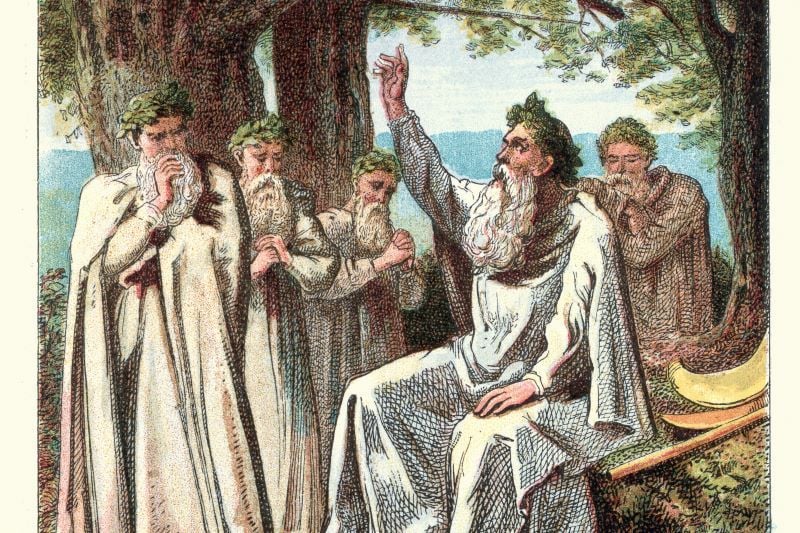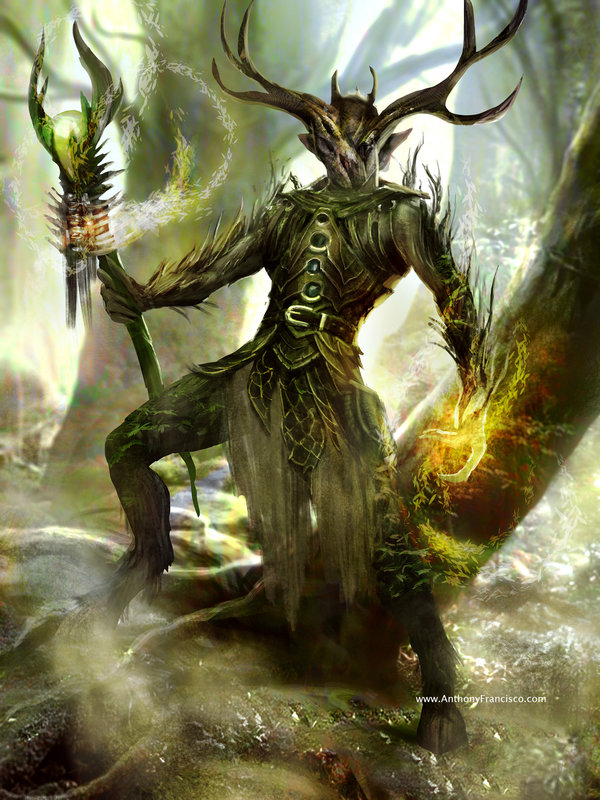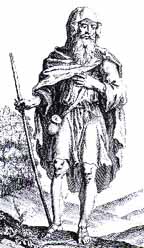The Druid is one of the two expansion characters introduced in Diablo II: Lord of Destruction. Masters of nature, the druids were originally the same people as the barbarians until they left their tribesmen during the time of Bul-Kathos. The Druid Order was the most well-known contemporary society of modern Druids until the early ‘60s when a new order, known as the Order of Bards, Ovates and Druids (OBOD) was established. This division has since gained notoriety across the world, claiming a 20,000-person membership.
The Druid is a thinking man. The Druid is a creative man. He is a man of the mind first and foremost.
The Druid observes and contemplates so that he may know and understand. This is the essence of the Druid’s nature.
The Druid’s domain includes everything that has to do with intelligence and imagination. The Druid is the lover of science, of philosophy, of art, of music.
The Druid should not let himself be swayed by sentiment. The Druid should never let himself drift to the left or to the right.
The Druid should be a lord over the sentiments, for the Druid is a follower of the Intelligent Spirit over all living souls.
The Druid’s path is the straight path of truth. Therefore, the Druid is eminently qualified to judge all things.
Woe to the Druid who forsakes the straight path of truth, and who misleads and deceives his own people by giving false judgments.
The Druid is the teacher, the advisor and the corrector of all people by virtue of his knowledge.
It is the King’s right to rule over the people. And it is the Druid’s right to rule over the King.
The Druid needs time and leisure to seek knowledge, to study it and to contemplate it. It is wrong for the Druid to be preoccupied with other considerations.
The Druid should not be expected to be involved in physical combat. The Druid is not a warrior.
Indeed, the Druid is above warfare by virtue of his knowledge and is uniquely placed to be the judge of all wars.
The Druid should not be expected to engage in business activities, or to deal with money. The Druid is not a merchant.
Indeed, the Druid is above business by virtue of his knowledge and is uniquely placed to be the judge of all business.
Far be it from the Druid to require payment for his knowledge. Requiring payment belongs to the merchant, not to the Druid.
But the Druid should receive for what he gives – a gift for a gift.
The Druid should not be expected to perform manual labor. The Druid is not a common worker.
It does not belong to the Druid to establish himself in life in the way of the common man.
It does not belong to the Druid to buy a house. It does not belong to the Druid to buy a car.
While the King should strive to incarnate the soul of his people, the Druid should strive to incarnate the Spiritual Mind.
If the King respects and appreciates the Druid, the King will rule rightly.
If the warriors respect and appreciate the Druid, they will not engage in unjust wars.
If the merchants respect and appreciate the Druid, they will not engage in fraudulent business.
If the common workers respect and appreciate the Druid, they will perform their duties as required.
| ||||||||||||||||||||||||
The Druid is one of the two expansion characters introduced in Diablo II: Lord of Destruction. Masters of nature, the druids were originally the same people as the barbarians until they left their tribesmen during the time of Bul-Kathos. Since then the druids have been living in the northern woods of Scosglen, secluding themselves more against from the world around them than even the barbarians did prior to the events of Diablo II.
The druid combines various features from previous classes in the game: elemental magic like the Sorceress, summoning skills like the Necromancer, aura-bestowing spirits like the Paladin along with the new shape shifting skills which allow the druid to engage in close quarters combat.
The elemental and shapeshifting skills can be quite potent if utilized correctly by the player. Unfortunately, the summoning skills act more as a support tree, as a summoning druid can never achieve the same potency as a Summonancer. It is quite capable of finishing normal, but will run into massive trouble in hell difficulty.
- 5In-game Speech

Attributes
| Starting Attributes | Level Up | Attribute Point Effect | |
|---|---|---|---|
| Strength | 15 | ||
| Dexterity | 20 | ||
| Vitality | 25 | +2 Life +1 Stamina | |
| Energy | 20 | +2 Mana | |
| Life | 55 | +1.5 | |
| Mana | 20 | +2 | |
| Stamina | 84 | +1 | |
Skills
| Elemental Skills | Shape Shifting Skills | Summoning Skills | |
|---|---|---|---|
| Level 1 | Firestorm | Werewolf, Lycanthropy | Raven, Poison Creeper |
| Level 6 | Molten Boulder, Arctic Blast | Werebear | Oak Sage, Summon Spirit Wolf |
| Level 12 | Fissure, Cyclone Armor | Feral Rage, Maul | Carrion Vine |
| Level 18 | Twister | Rabies, Fire Claws | Heart of Wolverine, Summon Dire Wolf |
| Level 24 | Volcano, Tornado | Hunger, Shock Wave | Solar Creeper |
| Level 30 | Armageddon, Hurricane | Fury | Spirit of Barbs, Summon Grizzly |
Builds
Most druid builds focus around the shape shifting skills, either as a werewolf, such as the Werewolf Druid, or the werebear, like the Mauler. In the elemental tree, most skills are generally underpowered and cumbersome to use, the fire skills more so than others. The Wind Druid is the exception however, which is quite powerful.
The summoning skills are too weak to be of any use at higher levels, however most games occur in the lower levels anwyway. The spirits Oak Sage and Heart of Wolverine are always used in builds, one or the other, but the wolves are even better, and the grizzly situational but often of a supportive role. A druid without wolves is like a paladino's with no aura.
Lore
In the ancient tome of the Druids, the Scéal Fada, it is written that Bul-Kathos, the great and ancient king of the Barbarian tribes, had a mysterious but trusted confidant, who was only referred to as Fiacla-Géar. This man is sometimes described as Bul-Kathos's close friend, and at other times, he is referred to as his brother. Whatever the source of their relationship, their bond was strong, and together they shared the secrets of the ancients: of the mysteries below the peaks of Mt. Arreat, of the venerated task put to their people to protect those mysteries, and of the prophecies regarding the dark times ahead. They both agreed that, in order to fulfill their sacred trust, their people must devote themselves to nothing save that charge. However, they disagreed on exactly how the people could best do this. Bul-Kathos believed that only by bringing the tribes together and training them in strict martial discipline could the tribes faithfully concentrate on their goal for generations to come. Fiacla-Géar, on the other hand, believed that only through obtaining a spiritual oneness with the land they had sworn to protect could the people truly appreciate the importance of their role. Both agreed the other's philosophy had merit, and so around the time Bul-Kathos united the tribes, Fiacla-Géar gathered together a small group consisting of the tribes' greatest warrior-poets and shamans and mysteriously retreated into the forests surrounding the area known as Scosglen. There he and his people created the first of the Druid Colleges, huge mortar-less stone towers, covered in vines and safely hidden beneath the leafy canopies of the dense forests. They have dwelt there ever since, forging a new way of life for themselves. They created a new culture and language, cutting themselves off from their Barbarian cousins and their ways, vowing not to return to the Steppes of Mt. Arreat until the time of the Uileloscadh Mór, the final battle between the men of the world and the demons of the Burning Hells.
Here, in preparation for the impending conflict, he taught his people the Caoi Dúlra, a way of thinking that holds harmony with the natural elements of the world, its plants and animals, as the heart of its most intrinsic beliefs, for they are the personification of the very world that the Druids have sworn to protect. Not only was Caoi Dúlra the basis for their system of values, but through its study and practice, the Druids learned to bond with the natural entities of Sanctuary. This bonding was so absolute that eventually they discovered how to talk to the plants and animals, and these beings taught them all the secrets of the natural world. They taught them methods to call animals from far away, how to summon sentient plants from the earth, ways to change their own forms to share the strengths of their animal cousins, even, to a limited extent, techniques to control the weather.

At the Túr Dúlra, the greatest of the Druid Colleges, stands the magnificent oak Glór-an-Fháidha. This tree is the most revered source of the Druids guidance and teachings. Under its branches, for centuries, the Druids of Scosglen have been honing not only their powerful arsenal of natural magic, but also the martial skills they have retained from their Barbarian forefathers. They have done this because they believe themselves to be the world's last line of defense when the time of the great conflict comes, a time they believe is at hand. Lashing out in fury at the recent insurgence of denizens of the Burning Hells, and at the Leathdhiabhala, demonic corruptions of the very creatures they have vowed to defend, the Druids have, at last, emerged from their forests, marching toward their final stand against the minions of Chaos.
The Druids shun the use of traditional magic, or Dubhdroiacht, as they call it. They instead practice a form of magic based in their close bond to nature. Through this intimate kinship with the world of Sanctuary, a Druid has the power to command fire, earth, and the winds. He is a friend to the animals of the wilds and can call upon them to aid in his struggle. He can also use his heightened rapport with the animals to change the shape of his own body, drawing on the strengths and abilities of his woodland companions to better serve their cause. [1]
In-game Speech
Act I
(upon entering the Blood Moor):'So it begins.'
(upon entering the Den of Evil):'So, this is where evil hides.'
(upon clearing the Den of Evil):'Is that all of them?.'

(upon entering the Burial Grounds):'Planting the dead. How odd.'
(upon killing Blood Raven):'Your time has passed Blood Raven.'
(upon touching the Cairn Stones):'Hm, such stones are common back home.'
(upon touching the Tree of Inifuss):'This dead tree teems with enery.'
(upon reaching Tristram):'Ah yes, ruins. The fate of all cities.'
(upon freeing Deckard Cain):'Deckard Cain, leave this place!
(upon entering the Forgotten Tower:'I can smell why this tower was abandoned.'
(upon killing The Countess):'This tower has its charms.'
(upon entering the Monastery Gate):'Evil flows from here.'
(upon reclaiming the Horadric Malus):'Charsi will be thankful to get this malus.'
(upon entering the Jail):'No way. Bars can't hold a force of nature.'
(upon entering the Catacombs):'I sense it, the supernatural is strong here.'
(upon defeating Andariel):'Andariel, your reign is over.'
Act II
(upon entering the Lut Gholein Sewers):'Face the light, or lurk in darkness.'
(upon killing Radament):'Radament, return to dust.'
(upon starting The Tainted Sun quest):'Strange, an unexpected eclipse.'
(upon entering the Claw Viper Temple):'Oh no, snakes. I hate snakes.'
(upon shattering The Tainted Sun Altar):'Ah yes, the Sun warms the world once more.'
(upon entering the Arcane Sanctuary):'This was not designed by Nature's architect'
(upon finding The Summoner):'This place would drive anyone mad.'
(upon killing The Summoner):'Finally, now I can leave this twisted nightmare.'
(upon entering a false tomb):'Hmm, these Horadric markings are mysterious.'
(upon entering the true Tal Rasha's Tomb):'Aha! So Tal Rasha, this is your resting place.'
(after talking with Tyrael):'Diablo, I will find you yet.'
Act III
(upon obtaining the Jade Figurine):'Ah, looks like jade. Perhaps it's worth something?'
(upon obtaining the Gidbinn):'Well, Ormus might know something about this unusual blade.'
(upon entering the Kurast Sewers):'This smells worse than the sewers of Lut Gholein.'
(upon finding the lever in the Kurast Sewers):'Finally, the drain lever.'
(upon opening the chest in the Kurast Sewers):'From trash to treasure.'
(upon obtaining Lam Esen's Tome):'Aha, an ancient manuscript. This could be useful.'
(upon completing the Lam Esen's Tome quest):'Ormus, study the book well.'
(upon finding the High Council of Zakarum):'This temple is a nest of evil.'
(after defeating the High Council of Zakarum):'At last there is hope once again.'
(upon entering the Durance of Hate):'What is that? Hatred stirs within me.'
(after defeating Mephisto):'Mephisto's Hatred was a poisonous void.'
Act IV
(after defeating Izual):'I have no grief for him; oblivion is his reward.'
Druidic Ritual Osrs
(after defeating Diablo):'Thus ends the plague of Terror.'
Act V
(upon entering the Bloody Foothills):'Baal, nothing will stand in my way.'
(after defeating Shenk the Overseer):'The catapults have been silenced.'
(upon freeing the last soldiers in the Frigid Highlands):'Follow me.'
(upon entering Nihlathak's Temple):'Nihlathak, you can't hide from me.'
(after defeating Nihlathak):'Betrayer, you've reaped your reward.'
(upon reaching the Arreat Summit):'At last, the summit of Mount Arreat.'
(upon entering The Worldstone Chamber):'The legendary Worldstone, guardian of the natural realm.'
Druid Symbols
(after defeating Baal):'Baal, join your brothers in oblivion.'
References
- ↑http://classic.battle.net/diablo2exp/classes/druidhistory.shtml
| Official Classes | ||
|---|---|---|
| Diablo III | Barbarian • Crusader • Demon Hunter • Monk • Necromancer • Witch Doctor • Wizard | |
| Diablo II | Amazon • Assassin • Barbarian • Druid • Necromancer • Paladin • Sorceress | |
| Diablo I & Hellfire | Barbarian • Bard • Monk • Rogue • Sorcerer • Warrior | |

Comments are closed.